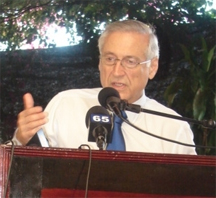United Nations (UN) Assistant Secretary General, Heraldo Munoz on Wednesday said that Latin American and Caribbean governments need to move away from the “iron fist” in fighting crime and violence, choosing instead softer approaches.
Munoz who is also the UNDP’s Assistant Administrator and Regional Director for Latin America and the Caribbean was at the time addressing reporters at a media session where his organization also used the opportunity to raise awareness of the Caribbean Human Development Report 2012 that was launched in Trinidad earlier this year.
The report assesses the current state of crime as well as national and regional policies and programmes to address the problem in seven English- and Dutch-speaking Caribbean countries: Antigua and Barbuda, Barbados, Guyana, Jamaica, Saint Lucia, Suriname, and Trinidad and Tobago.

“What governments should try to avoid is the easy answers of the iron fist. Often times, public opinion demands more action from governments with regard to crime and violence,” Munoz said. The UN official argued that the “multi-dimensional” approach should include working with communities and reforming the justice and penal systems.
He said that the report, which was the product of wide-ranging consultations and surveys with politicians, experts and ordinary people, recommends that more attention be placed on tackling youth violence, street gangs and domestic violence.
Further, he stated that Latin American and Caribbean governments have committed themselves to doing more to tackle crime and insecurity. At the same time, he highlighted that donors, like his organization, are increasingly strapped for cash to fund initiatives in the Caribbean because many countries are now classified as Middle Income countries. This coupled with the fact that donor nations are still struggling in the global recession places the UNDP in a “very sensitive” position. Nevertheless, the UNDP assists in mobilizing some funds and expertise.
If the Caribbean can successfully tackle crime and insecurity, he says evidence shows that countries can save more money and attract more tourists for example.
Munoz outlined the focus of the UNDP’s financing in Guyana explaining that although there are many projects the organization will zoom in on reducing poverty and the establishing of a social protection network which will advise on how to accelerate the attainment of the Millennium Development Goals (MDGs).
Democratic governance, of which the issue of security is also a part, will also be a key area looked at here. He said that the UNDP has been constantly hearing from governments that they need to get more actively involved in citizen security from a development perspective. Munoz made reference to the current training of parliamentary staff and the promotion of political dialogue among other initiatives.
Further the organization will focus on the prevention of natural disasters and sustainable development. The latter has been intensified following the last Rio 20+ summit held in Brazil and the Ministry of Agriculture is the main beneficiary of funding.
Questioned as to the objectivity of the report and its ensuring that its priorities are what the people of the respective countries want, Munoz stressed the neutral stance of the UN. “The UN is a neutral actor we don’t take sides. We try to have proof. The data we use is government data we don’t refuse data and it’s government that provides… let me emphasize we did 450 interviews with expert people from civil society people from government, opposition including 11,555 citizens in seven countries”, he said.
“That is an element to show that we did our best to be objective. The UN doesn’t have a hidden political agenda in a sensitive issue like this …our desire is to try to contribute to tackling of problems such as citizen security and not anything else”, he added.
Caricom’s Secretary General Irwin Larocque was unable to attend the event and Assistant Secretary-General, Foreign and Community Relations, Colin Granderson, spoke. He echoed much of what Munoz said, adding that a holistic and sustained approach was needed to combat crime. Governments, the judiciary, law enforcement agencies, the private sector, the media and other civil society groups should be involved, he stressed.
“It makes compelling arguments for the co-ordinated involvement of a range of partners in addressing the solutions to this scourge which we are witnessing every day primarily through the media and for too many of us, through our own personal experiences and those of our friends and loved ones” said Granderson.




